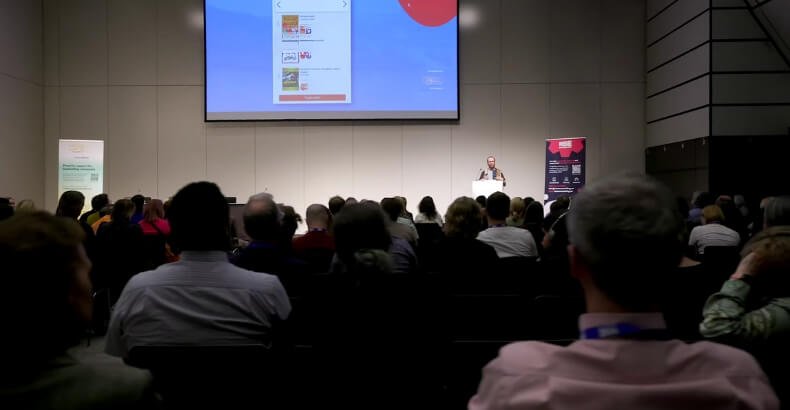The nursing conference plays a crucial role in bringing together healthcare professionals in one place. These events attract expert medical professionals to discuss the latest trends and innovations. If you’ve ever wondered how to organize a successful nursing conferences, don’t worry.
Organizing a successful nursing conference involves several important steps. First, define the event’s purpose to ensure it aligns with attendees’ needs. Select a suitable venue and invite experienced speakers. Designing an engaging program, providing resource materials, and managing logistics efficiently also contribute to event success.
Still curious about the topic? Continue reading to find out all the essential information you need to successfully organize a nursing conference. This article covers every aspect to help you create a memorable and valuable event.
Organizing a Nursing Conference: Why is It Important?
Organizing a nursing conference advances healthcare by encouraging knowledge exchange and professional development. These events provide a platform for nurses to share research, discuss innovations, and build collaborative networks that contribute to patient care.

Additionally, nursing conferences promote collaboration among various healthcare disciplines. Participants can network with peers, share experiences, and discuss challenges faced in their work environments. This collaboration often leads to partnerships that enhance care quality in different healthcare settings. Engaging in these discussions can inspire innovative solutions to common issues.
Another significant aspect of organizing nursing conferences is the focus on professional development. Attendees often have access to workshops and training sessions that can improve their skills. These learning opportunities help nurses grow in their careers and contribute more effectively to their teams. Knowledge gained at conferences can be applied in real-world situations, benefiting both healthcare workers and patients.
A well-organized conference ensures that all logistical aspects are managed efficiently, from venue selection to scheduling and participant engagement. In that case, a professional nursing conference organizer plays a vital role in coordinating these elements, ensuring that the event runs smoothly and meets the expectations of attendees. Their efforts are key to creating a memorable and productive experience for everyone involved.
Essential Aspects of Organizing a Nursing Conference
Organizing a nursing conference requires careful planning to ensure an enjoyable and impactful experience for participants. Each aspect plays a crucial role in making the event informative, inclusive, and well-structured for all attendees.
- Promoting Diversity: A successful nursing conference promotes diversity by welcoming participants from various backgrounds and specialties. This encourages a richer exchange of ideas and promotes inclusive networking opportunities.
- Sponsorship and Funding: Securing sponsorships helps cover expenses and enriches the event with additional resources and activities. Strong financial backing allows organizers to offer scholarships, workshops, or social events, enriching the participants’ experience.
- Accessibility for All Attendees: Ensuring the venue and materials are accessible to people with disabilities is vital for an inclusive environment. Organizers should also consider virtual participation options to accommodate remote attendees.
- Safety and Security Measures: Safety is a top priority, requiring clear protocols for emergencies and health regulations. Organizers should also implement cybersecurity measures for digital attendees and personal data protection.
- Effective Marketing and Outreach: Promoting the conference through various channels attracts a diverse audience and increases attendance. Timely communication of key information, such as deadlines and schedules, ensures participants are well-prepared for the event.
How to Organize a Successful Nursing Conference?
There are several steps involved in organizing a successful nursing conference. You have to plan these events carefully and pay attention to every detail. From choosing the right venue to inviting speakers, every aspect plays a role. There is much more to explore when considering how to create a successful nursing conference.

Defining the Purpose
The first step in organizing a nursing conference is defining its purpose. Whether it’s sharing research, offering hands-on workshops, or providing networking opportunities, having clear objectives ensures the event aligns with attendees’ needs and supports their professional growth.
Selecting the Venue
Choosing the right venue plays a key role in the success of a nursing conference. The venue should be accessible to all participants and equipped with the necessary facilities like seating, audiovisual tools, and accessibility options. This ensures a comfortable and smooth experience for everyone involved.
Inviting Expert Speakers
An expert speaker brings valuable knowledge to a nursing conference. Invite speakers who are experienced in relevant areas and can present information in a clear, engaging way. A variety of professionals, including researchers and clinicians, will provide a rich learning experience.
Creating an Engaging Program
Attendees are kept engaged throughout the nursing conference by an engaging program. A combination of keynote presentations, panel discussions, and interactive workshops can offer a variety of learning experiences. This helps ensure that all attendees benefit from the different types of content and discussions.
Offering Resource Materials
Providing attendees with resource materials, such as printed handouts or digital resources, helps reinforce key information shared during the conference. These materials serve as valuable references that participants can use later to apply what they learned in their practice, extending the value of the event.
Managing the Logistics
Handling logistics effectively is crucial for a successful nursing conference. This includes managing registrations, ensuring smooth transitions between sessions, and offering support to attendees when needed. Good logistics planning contributes to a well-organized and enjoyable experience for all participants.
Global Nursing Perspectives
You should carefully consider key aspects of international nursing conferences when organizing a productive event. These conferences often feature diverse topics, multicultural attendees, and global healthcare insights. Incorporating these elements can raise the event to an international standard, enriching the experience for all participants.
Engaging Participants Through Technology
Incorporating technology can greatly improve attendee engagement. Tools like live polling, interactive apps, and virtual Q&A sessions can make the nursing conference more interactive. These technologies allow participants to connect with speakers and each other, creating a dynamic and collaborative environment.
Marketing the Conference Effectively
Having a marketing strategy is essential to attracting attendees. Organizers should use multiple platforms, such as social media, email campaigns, and professional networks, to spread the word. Clear messaging about the benefits of attending the conference will help reach the target audience and boost participation.
Ensuring Post-Conference Follow-Up
Maintaining connections with attendees after the conference is important. Sending thank-you emails, sharing recorded sessions, and offering additional resources helps attendees continue learning and stay engaged. This follow-up fosters a sense of community and keeps participants connected for future events.
Planning and paying attention to detail are crucial to the success of a nursing conference. By focusing on key elements, such as purpose, logistics, and engagement, you can create a valuable experience that benefits all attendees and enhances the nursing community.
What to Consider When Choosing Speakers for Your Conference?
A successful conference depends on selecting the right speakers. Speakers help set the tone and engage the audience throughout the event. Here are some tips to help you choose speakers.
Expertise in the Topic
Make sure the speakers you choose have a strong background in your conference’s topic area. Their expertise will allow them to provide valuable insights and information that resonates with your audience. When speakers are knowledgeable, they can answer questions and engage in meaningful discussions, enhancing the overall learning experience.
Engaging Speaking Style
The ability to connect and engage an audience is just as important as the speaker’s expertise. Look for individuals who can present their ideas clearly and maintain the audience’s interest throughout their session. A lively speaking style, paired with interactive elements like Q&A sessions or audience participation, helps keep attendees focused and energized during the presentation.
Alignment With Conference Goals
Your chosen speakers should align closely with the overall goals and objectives of your conference. Speakers are crucial to the success of any event, regardless of whether it is focused on education, networking, or inspiration. This alignment ensures that the content is relevant and meaningful, providing attendees with the insights and experiences they seek.
Availability and Scheduling Flexibility
Consider the availability of potential speakers and how they fit into your conference schedule. Make sure that the timing works well for both the speaker and your event timeline. Flexibility in scheduling can facilitate a smoother process for everyone involved, allowing for better communication and coordination as the event date approaches.
Reputation and Audience Appeal
Selecting speakers with a positive reputation and broad appeal can significantly enhance your conference’s attendance and overall success. You should consider individuals who have a strong track record of successful speaking engagements and who are well-known within your industry. A respected speaker can attract more participants and improve the overall reputation of your conference, leading to a more impactful experience.
How to Choose the Right Venue for Your Nursing Conference?
The choice of the right venue is crucial to the success of a nursing conference. The venue sets the tone and provides the necessary facilities for attendees. It also impacts accessibility and the overall experience of participants. Thoughtful venue selection can enhance engagement and satisfaction.

Step 1: Assess Accessibility
Start by assessing the venue’s accessibility for all participants. Consider its location, transportation options, and parking availability. Ensure the venue is easy to reach, especially for those with disabilities. A favorable location boosts attendance and participant satisfaction.
Step 2: Review Facilities
Analyze the facilities offered by potential venues. Check for enough seating, audiovisual equipment, and breakout rooms for workshops. The venue should also provide spaces for networking and informal discussions. These facilities are essential for creating a successful conference experience.
Step 3: Consider Capacity
Determine the expected number of attendees and choose a venue that comfortably accommodates them. A space that is too small may feel overcrowded, while one that is too large can seem empty. Proper capacity enhances engagement and overall participant experience.
Step 4: Review Costs
Make sure you review all costs associated with each venue before choosing one. Look at rental fees, deposits, and additional charges for equipment or services. Comparing these costs to your budget helps find a venue that provides the best overall value.
Step 5: Visit the Venue
Confirming your choice requires a personal visit to the venue. This allows you to assess the layout, ambiance, and facilities firsthand. Take notes on any potential issues or benefits. A site visit ensures the venue meets your expectations.
For a nursing conference to be successful, the venue must be chosen carefully. Thoughtful selection improves the attendee experience and promotes engagement. By following these steps, you can ensure a successful and enjoyable conference for everyone involved.
Is It Necessary to Include a Networking Session in Your Nursing Conference?
A networking session can be a valuable addition to a nursing conference, enhancing professional growth and collaboration. It allows attendees to share experiences, build connections, and exchange ideas. Networking helps professionals learn from one another.
Building Professional Connections
Taking part in networking sessions is an excellent way to build professional connections. Attendees can meet peers from different areas of nursing, healthcare, or research. These connections may lead to future collaborations, job opportunities, and mentorship, helping participants advance in their careers and professional development.
Sharing Knowledge and Ideas
During networking, participants can share knowledge and discuss their experiences in various fields of nursing. This exchange of ideas often leads to creative solutions for common challenges in the healthcare sector. Networking encourages a rich flow of information that benefits all attendees.
Increasing Collaboration
Networking sessions are key to developing collaboration among attendees. They connect nurses, healthcare professionals, and researchers, paving the way for joint initiatives and partnerships. The value of nursing conferences lies not only in the knowledge shared but also in the collaborations formed, which can drive innovation in nursing practices.
Strengthening Professional Community
Nurses benefit from networking because it brings them together with each other. The relationships built during these sessions help create a support system among healthcare workers. A strong community benefits not just individuals but the entire profession, promoting long-term growth and solidarity.
Enhancing Conference Engagement
Including a networking session increases overall engagement at the conference. Attendees feel more connected to the event and are likely to participate more actively in discussions and workshops. Networking makes the conference experience more interactive and fulfilling for everyone.
The value of networking at nursing conferences can be summarized as follows: By building connections and encouraging collaboration, it improves the overall experience and benefits both the individual participants and the profession as a whole.
Tips for Creating an Agenda That Will Engage Attendees
Your conference’s agenda should be engaging to succeed. A well-planned agenda keeps attendees interested and involved throughout the event. Here are some tips to help you prepare an agenda that attracts your audience.

- Start with a Strong Opening Session: Begin the event with an engaging session that captures attention, energizes the audience, and sets a positive tone for the entire day.
- Balance Content and Networking: Move between informative sessions and networking opportunities to keep attendees engaged and allow them to absorb information while building valuable connections.
- Include Interactive Workshops: Offer hands-on workshops where attendees can actively participate, apply what they’re learning, and engage more deeply with the content being presented.
- Feature Case Studies and Success Stories: Incorporate real-world examples and success stories to make the content relatable, engaging, and directly applicable to attendees’ own experiences.
- Offer Personalization Options: Allow attendees to choose sessions that match their interests, providing a personalized experience that keeps them engaged and invested in the event.
- Keep Sessions Concise: Plan shorter, focused sessions to maintain high energy levels, keep attention sharp, and prevent attendees from experiencing information overload.
- Use Visual Aids and Media: Include videos, slides, and live demonstrations to enhance presentations, making them more engaging and easier for attendees to follow.
- End with a Memorable Closing: Conclude the event with a compelling session that summarizes key points and leaves a lasting, positive impression on all attendees.
By following these tips, you can create an agenda that keeps your attendees engaged and makes your event a success. A carefully designed agenda benefits both organizers and participants alike.
How to Encourage Attendee Feedback for Future Conferences?
Collecting feedback from attendees is essential for improving future conferences. Encouraging meaningful feedback helps organizers understand what works and what needs improvement. Here are key strategies to help you make this process go smoothly and efficiently.
Make Feedback Easily Accessible
Ensure that feedback forms or tools are available throughout the entire nursing event. Digital tools, such as online surveys or conference apps, simplify the process. Attendees are more likely to share their thoughts if the method is quick and accessible. Providing easy access encourages participation and ensures you receive valuable insights without delay.
Offer Incentives for Participation
The use of incentives is a proven method of encouraging attendee feedback. These incentives could be small rewards like gift cards, discounts on future events, or access to exclusive resources. When participants feel that their time and input are valued, they are more likely to provide thoughtful and detailed feedback, improving their knowledge of their experience.
Provide Multiple Channels for Feedback
Different attendees have varying preferences for how they share their thoughts. Some may prefer filling out a survey, while others might like direct communication through email or face-to-face discussions. Providing multiple channels for feedback ensures that attendees feel comfortable and engaged, helping you capture a broad range of insights from different perspectives.
Engage Attendees During the Conference
Feedback collection doesn’t have to wait until after the event. Engaging attendees with interactive tools like live polls, session ratings, or short surveys during the conference helps capture real-time opinions. This approach makes it easier for attendees to share their immediate thoughts and provides valuable feedback while the experience is still fresh in their minds.
Show How Feedback Is Used
When attendees see that their feedback has influenced future conferences, they feel more invested in the event’s success. Providing updates on how their suggestions were implemented not only builds trust but also encourages ongoing participation in feedback activities. This openness encourages a sense of collaboration between organizers and attendees.
Gathering feedback from attendees is crucial for shaping future conferences. By using different methods and creating a transparent system, you ensure a steady flow of insights to guide your event’s future success.
Backup Planning Tips for Nursing Conferences
During any event, unexpected situations can arise, making backup planning essential. Ensuring all details are prepared in advance reduces stress and keeps things on track. Here are some practical tips to help with efficient planning.

- Have a backup venue in mind in case your primary location becomes unavailable. This ensures that your event continues smoothly without major disruption to the schedule.
- Create a flexible schedule that allows room for last-minute changes or delays. A flexible approach helps in managing unforeseen issues without disturbing the flow of the event.
- Keep extra equipment available, such as microphones, projectors, and laptops. These backups ensure that technical issues don’t stop important sessions or presentations.
- Assign a dedicated team to handle unexpected technical difficulties. This team can quickly step in to resolve issues and minimize any impact on the event.
- Ensure all digital presentations are backed up on multiple devices and cloud storage. This prevents data loss or access problems during key sessions.
- Have different transportation options arranged for speakers and attendees. This can help if unexpected travel delays or cancellations occur.
- Provide clear emergency procedures to all staff and participants. Knowing how to respond quickly to emergencies ensures the safety and well-being of everyone.
- Arrange for extra staff to handle unexpected increases in attendee numbers or special assistance needs. This allows you to manage larger crowds or special circumstances without stress.
- Prepare a list of alternative speakers in case scheduled presenters are unable to attend. This ensures that the conference program can continue without disruption.
- Ensure you have alternative plans for catering in case of issues with the original provider. Arranging alternative meal options ensures participants are taken care of.
Proper planning is key to ensuring that a nursing conference runs smoothly, even when the unexpected occurs. These backup strategies will help keep everything on track and create a positive experience for all involved.
Frequently Asked Questions
Nursing conferences require various considerations and details to be successful. To help you understand this process, we’ve put together a list of frequently asked questions. These answers provide essential insights and practical tips for ensuring your event is both impactful and memorable.
How Do I Assemble an Effective Organizing Committee?
To assemble an effective organizing committee, select individuals with diverse skills in event planning, finance, marketing, and nursing education. Clearly defining roles and responsibilities enhances collaboration and decision-making, ensuring everyone understands their contributions toward the conference’s goals.
What Is the Best Way to Manage Registrations and Ticketing?
Utilize a user-friendly, secure online registration platform for managing registrations and ticketing. This makes it easy for attendees to sign up and pay. Offering early-bird discounts and group rates can encourage prompt registration and improve overall attendance.
How Can I Design Effective Conference Materials and Signage?
Create clear, professional materials like programs, name badges, and directional signs. Consistent branding and easy-to-read information help attendees navigate the event smoothly. High-quality materials enhance the conference’s overall impression, conveying professionalism and attention to detail.
How Do I Provide Excellent Hospitality and Attendee Services?
Ensure attendees have comfortable facilities, refreshments, and attentive staff. Providing amenities like Wi-Fi, charging stations, and quiet areas enhances the experience. Attentive service makes participants feel valued and welcome, fostering a positive environment for networking and collaboration.
How Can I Engage Student Nurses in the Conference?
Offer special rates or scholarships to encourage student nurses to attend. Include sessions relevant to their education and career development. Involving students enriches the conference experience and supports the future of the nursing profession by inspiring new ideas.
What Role Does Social Media Play in Enhancing the Conference Experience?
A conference’s social media presence promotes the event and engages attendees before, during, and after the event. Creating event-specific hashtags encourages participants to share their experiences, building community and expanding your event’s reach and impact through online interactions.
How Do I Ensure Compliance with Legal and Ethical Standards?
Make sure you comply with the necessary permits, licenses, and insurance requirements. Adhere to ethical guidelines related to data privacy, accessibility, and professional conduct. Compliance protects your organization and builds trust with attendees and partners, reinforcing credibility and professionalism.
End Note
Organizing a successful nursing conference requires careful planning and attention to detail. Key elements include defining the purpose, selecting an accessible venue, and engaging expert speakers. By following these strategies, you can ensure that the event meets the needs of attendees and promotes professional growth, answering the question of how to organize a successful nursing conferences.
As you move forward, remember to prioritize effective communication and participant engagement throughout the planning process. Providing excellent hospitality and gathering feedback post-event can also improve future conferences. Best wishes for your conference planning process; may your efforts lead to a memorable and impactful experience for all involved.